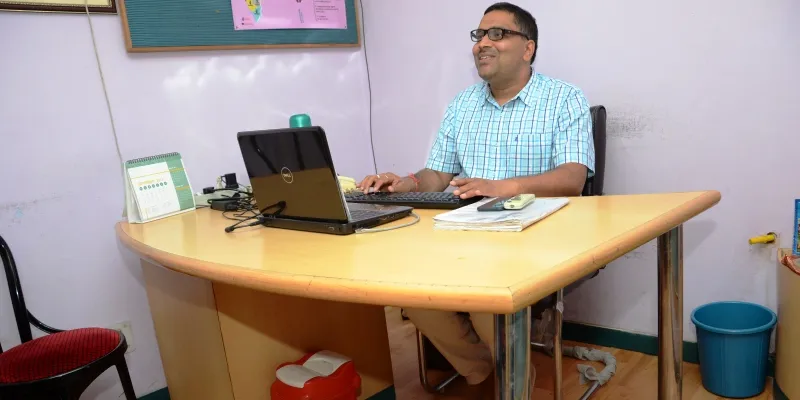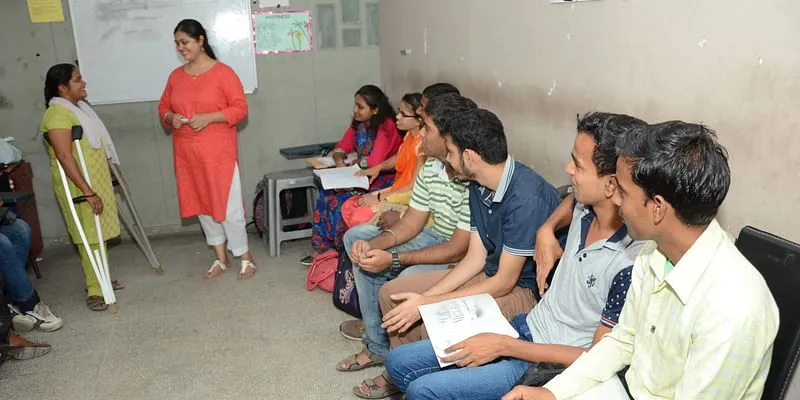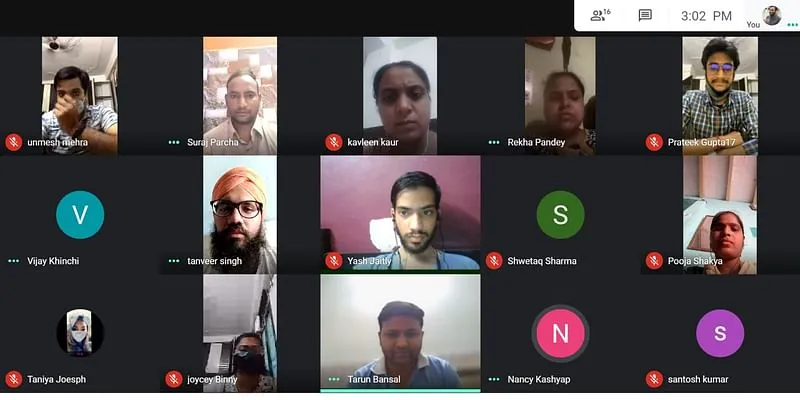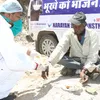Skilling for employability: how Sarthak Educational Trust is empowering PwDs find jobs during the pandemic
Sarthak Educational Trust has been skilling people with disabilities to find jobs based on their capabilities. During the pandemic, the organisation went digital to train more members and has helped more than 2,500 people find jobs.
Jitender Aggarwal was diagnosed with macular degeneration of retina, a non-treatable concern, at the age of 30, which took away his vision. Jitender, who was practising dentistry then, was suddenly drooping into darkness and did not know what to do. However, after three years, he gathered courage and decided to pick himself up and started pursuing other career options.
“While I was exploring livelihood options for myself, I realised the challenges of people with disabilities (PwDs) in India. So, I researched about their biggest challenges and realised that their livelihood options were minimal in the private and corporate sectors,” Jitender tells SocialStory.
That’s when Jitender decided to empower PwDs with a livelihood and founded Sarthak Educational Trust, an organisation that empowers this population through the verticals of health, education, employment, vocational training, awareness generation, etc.

Jitender Aggarwal
Founded in 2008 as a single centre in Delhi, Sarthak now has about 20 centres across India in Delhi, Chandigarh, Gurugram, Ludhiana, Lucknow, Jaipur, Hyderabad, Mumbai, Pune, Ambala, Bhopal, Kolkata, Ghaziabad, Visakhapatnam, and Chennai. This was executed thanks to the support of National Skill Development Corporation, Capgemini India Private Limited, Mahindra Finance, and various other agencies and organisations.
Through its education programmes, the NGO has rehabilitated more than 1,500 (early intervention) and 425 (inclusive education programme) children with disabilities. Its skill development centres have trained more than 20,000 PwDs in the tourism, hospitality, organised retail, and IT sectors.
Apart from this, the organisation has also conducted Ambilympics – eight regional events, two national competitions, and one international event in Abu Dhabi, UAE.
Even during the COVID-19 pandemic, Sarthak went a step ahead to scale its activities in the virtual space, and got more members on board. Jitender tells Social Story about the fight with the pandemic and how the organisation has progressed over the years to create an inclusive society.
Skilling PwDs for jobs
Since its inception, Sarthak has been urging corporates to hire PwDs based on their capabilities. The organisation was able to crack jobs in sectors like retail, BPOs, hospitality, etc. It also simultaneously organised job fairs across India for PwDs in different states - from Jammu and Kashmir to Tamil Nadu.
So far, it has conducted over 150 job fairs in 21 states, and more than 60,000 people have registered with the organisation.

One of the training sessions
“The challenge was that their skill-sets were not fulfilling the market requirement, and so we decided to open skill centres to train these people. From 2014 to 2020, we expanded to about 15 states and conducted suitable skilling programmes for people with disabilities,” says Jitender.
According to the organisation, about 20,000 people have been employed in corporates and other sectors through these fairs and skill centres since 2014. The demand has also become high, with over 1,000 employers in the various employment sectors.
“Right now, due to the pandemic, we are restricted in our growth, but we usually open about three to four centres in every state per year,” he says.
Pacing with the pandemic
Within a week after the lockdown was announced, Sarthak started online training programmes for its members. However, the earlier days were a bit challenging.
“Despite the challenges, our team was able to lay down an idea to take our programmes to the virtual space,” says Jitender.
Tarun Bansal has been associated with Sarthak for the past six years as its operations leader. During the pandemic, Tarun and his team were proactive in helping their members cope with the pandemic.
“Sarthak has been reaching out to PwDs via telecom and video conferring and helping them with COVID-19 counselling, virtual vocational skill development training, and employment support,” says Tarun.
Since then, about 2,500 people with disabilities have been trained successfully through the online sessions, out of which 1,000 people have landed a job. Thus, the pandemic provided an opportunity for Sarthak to scale its reach, says Tarun.

Virtual counselling with Tarun Bansal
“In the physical centres, we only used to see about 60 percent attendance. However, the online classes reflect a lot of participation. Moreover, we were also able to generate work-from-home opportunities for these people,” he says.
As far as layoffs are concerned, Jitender says that about 10-15 percent of PwDs, especially in the hospitality sector, faced an issue, but were not laid off and were all retained with a minimum salary. In other sectors, no PwDs were laid off.
Additionally, more than 350 free therapies have been imparted virtually by the early intervention team for online therapeutic interventions, home-based activities, psychoeducation to parents of CWSN suffering from neurodevelopmental disorders like Autism, Down’s syndrome, intellectual disability, hearing impairment, speech and language deficits, and learning disability.
The organisation also struggled with the funding from April to June this year as the existing funders began contributing to other initiatives like PM-CARES funds, etc. However, in July, Sarthak started receiving donations again.
“Around 30-35 percent of the funds were withdrawn by our different agencies. But right now, we’re in a comfortable position to function well,” shares Jitender.
Road ahead
“In the last few months, Sarthak has learnt a lot, considering the fact we turned into a digital centre from being a physical centre,” notes Jitender.
“We have been monitoring most of the work through an online portal where we can keep a track of our activities,” he adds.
Additionally, it is coming up with a mobile app to reach out to all PwDs with no geographical distinction. The app will be available in six languages, and requires only two details from the members – their name and their mobile number.
Sarthak is also coming up with an E-LMS (E-learning Management System) for people with disabilities. About 25 percent of the content is ready, and it hopes to launch this platform by March 2021.
It is also laying foundation to a global resource centre in Gurugram, a first-of-its-kind in India. The centre aims to be a technological resource for PwDs in the rural parts of India.
“With this digital transformation, our outreach has extended to other countries like Nigeria, Somalia, Nepal, and others, not limiting our geographical boundaries,” Jitender says.
Edited by Megha Reddy







![[App Fridays] TikTok lovers, are you ready for Firework, the new short video platform in town?](https://images.yourstory.com/cs/2/a182c7e0140711e987e2f7248b252f46/Firework1571401406063png?mode=crop&crop=faces&ar=1%3A1&format=auto&w=1920&q=75)

